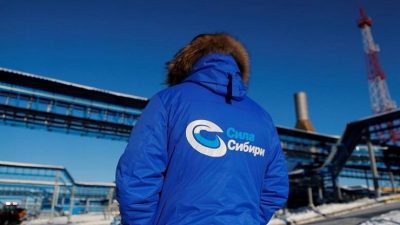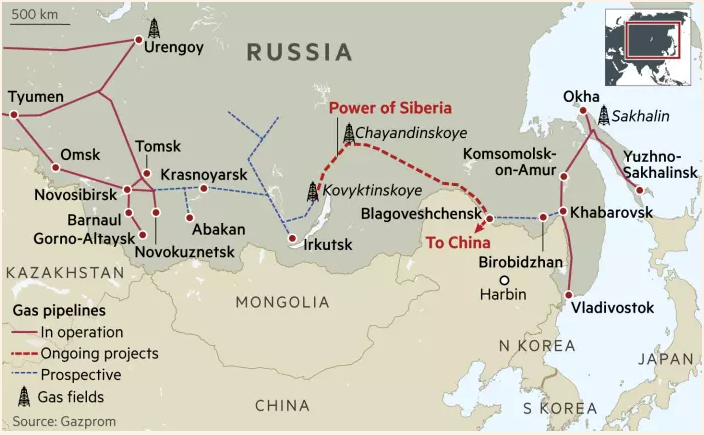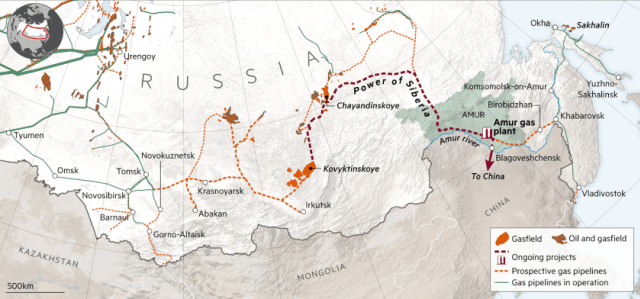Power of Siberia: Putin and the ‘Biden Memorial Pipeline’ to China

In early 2014 Washington staged a blatant coup d’etat in Ukraine breaking the historic relationship with Russia and setting the stage for the subsequent NATO demonization of Russia. The one in charge for the Obama Administration of the Ukraine coup was then-Vice President Joe Biden. Today a bizarre Democrat impeachment attempt aimed at President Donald Trump has curiously enough put the spotlight on the dubious role that Joe Biden played in Ukraine affairs in 2014 and after. That Biden-steered coup had the unintended effect of causing a 180 degree geopolitical pivot of Moscow from West to East. The opening of a massive new gas pipeline now is only one of those unintended consequences.
On December 2, Russian President Vladimir Putin participated in the official opening of the Power of Siberia natural gas pipeline to Asia, servicing the growing China gas market. It met the planned deadline punctually, to the month. This marked the first Russian pipeline gas deliveries to China. In a videolink with China President Xi Jinping, Putin remarked,
“This step is bringing Russian-Chinese strategic cooperation in energy to a whole new level.” Xi called it “a milestone project for the bilateral energy cooperation.”
The opening, a huge engineering feat, completes a pipeline through Russia’s Eastern Siberia north of Mongolia to the border with China, running more than 2,200 kilometers across Russia’s east territories. It is the largest gas pipeline project in the world to date.
The pipeline is designed to deal with temperatures as low as 62 C minus, and withstand earthquakes along its route. It begins in the Chayanda gas field in Yakutia and completes the Russian section at Blagoveshchensk on the Russia–China border. There, via two underwater pipelines under the Amur River, it connects with a Chinese gas line going south to Shanghai, the 3,371-kilometer-long Heihe–Shanghai pipeline in China. The world’s largest market demand increase for gas fuel in recent years has been China.
In May 2014, Gazprom and China National Petroleum Corporation (CNPC) signed a $400 billion 30-year agreement for gas to be supplied via the Power of Siberia gas pipeline. The Russian gas deliveries to China will be 38 billion cubic meters per year when it reaches peak in 2025. In 2018 China natural gas consumption was 280 bcm, so the Siberian contribution is significant. It will eventually supply some 10% of China’s total gas needs for electricity and heating, to China’s underdeveloped northeast regions and south as far as Shanghai. But the project is about much more than gas to China.
AMUR GPP
Completion of the major Power of Siberia pipeline to China involves more than a pipeline running through 2,200 kilometers of remote Russia. It is also being used as a catalyst to develop major industry in the economically underdeveloped Russian Far East as well, a priority of the Russian government in recent years.
A little discussed parallel development tied to the construction of the Power of Siberia pipeline is Gazprom’s decision to build Russia’s largest gas-processing chemical facility, the Amur Gas Processing Plant, or the Amur GPP. The Amur GPP is the largest construction project in Russia’s Far East, a $14 billion complex near Svobodny on the Zeya River in Amur Oblast, some 170 kilometers from the gas pipeline’s China connection point. The Amur GPP scale is enormous, the size of 1,100 football fields.
The complex will use a portion of the huge gas reserves of the Power of Siberia fields in East Siberia to produce a mix of petrochemicals that will include ethane, propane, butane, pentane-hexane fraction and 60 million cubic meters of helium annually. These are all industrial chemical components in strong demand. Most important is the large production of helium, a byproduct of natural gas used in space industry, metallurgy, medicine and other areas. Amur GPP will be the largest helium production plant in the world. Ethane, propane, butane, pentane-hexane will be used to produce polymers, plastics, lubricants and other things including motor fuel.
Regional Development
The Amur GPP project when complete in 2025 will be the largest gas processing plant complex in Russia and second largest in the world, bringing major new economic activity to the underdeveloped Far East region, a priority of the Russian government. In August 2017 Russian President Putin was present for the first pouring of the concrete foundation for the complex. In his remarks he noted that,
“In the past 50 years, our country has not seen anything similar. Neither the Soviet Union nor Russia have implemented projects of this scale. This plant’s capacity will be 42 billion, which is a breakthrough not only for the industry but also in the overall development of the Russian Far East.”
Putin added,
“During peak periods, the construction will require several thousand people, or almost 25,000 workers, to be more precise. Once the plant is complete, it will employ 2,500 to 3,000 people, which will allow us not only to move forward in gas production but also to create conditions for building another giant plant in the country and one of the largest in the world.”
The production from the Amur plant complex will be marketed for export to the Asian market as well as expanding the gas supply network for Yakutia and the Amur Region where until now commercial gas is almost non-existent.
The strategic partner of Gazprom responsible for the processing equipment and other engineering technology is the German company, Linde, a world leader in such specialized technology.
The Amur GPP complex will bring a major boost to Svobodny which like many towns in the remote Far East has been losing population following the collapse of the Soviet Union. The construction phase as noted is employing some 25,000 engineers and construction workers, most drawn from the region, adding a major economic boost. In addition Gazprom is building 42 new apartment buildings and 36 townhouses for some 5,000 people in Svobodny who will be permanently employed at the facility. There will also be a new school and kindergarten with a swimming pool, clinic, sports and cultural institutions. As well, Gazprom is cooperating with Amur State University and the Far Eastern Federal University, with new courses to train future specialists in chemical technology. The municipal government is already benefiting from tax payments from the presence of the project.
Pivot east
Ironically, we can title this the ‘Biden Memorial Pipeline.’ Had the Obama Administration not launched their coup d’etat in 2013 at Maidan Square in Kiev, with the subsequent ouster of the elected president in February 2014 in favor of literal neo-nazi parties and corrupt oligarchs under a US puppet regime, the completion of the Power of Siberia pipeline to China would likely not exist today. Negotiations with Beijing for the pipeline had been dragging on for more than ten years when the Ukraine coup took place. After that coup a final agreement was secured by Moscow with Beijing in a matter of weeks as Putin engineered a geopolitical pivot to the East away from NATO.
Vice President Joe Biden was named by Obama to oversee the Ukraine coup and its aftermath, which apparently included some corrupt sweetheart deals for Hunter Biden and possibly Joe Biden with Ukraine gas company Burisma.
The coup, carried out by then CIA head John Brennan, using sniper mercenaries from neighboring Georgia, together with neocon US State Department official Victoria “F**k the EU” Nuland, was one of the more foolish geopolitical blunders of Washington in recent decades. The pro-NATO coup was initiated when Viktor Yanukovich’s government had decided to accept generous Russian terms to join her Eurasian Economic Union rather than a vague promise of possible EU membership candidate status. Today Ukraine is treated with outcast status by the EU, and its economy is a shambles as a result of the break with Russia. In May, 2014, just weeks after the CIA toppled the duly elected government of Viktor Yanukovich in what Stratfor founder George Friedman called, “…the most blatant coup in (US) history,” Moscow signed the agreement with Beijing for the Gas Pipeline Deal of the Century, the Power of Siberia.
*
Note to readers: please click the share buttons above or below. Forward this article to your email lists. Crosspost on your blog site, internet forums. etc.
F. William Engdahl is strategic risk consultant and lecturer, he holds a degree in politics from Princeton University and is a best-selling author on oil and geopolitics, exclusively for the online magazine “New Eastern Outlook” where this article was originally published.
F. William Engdahl is a Research Associate of the Centre for Research on Globalization (CRG)
Featured image is from NEO



